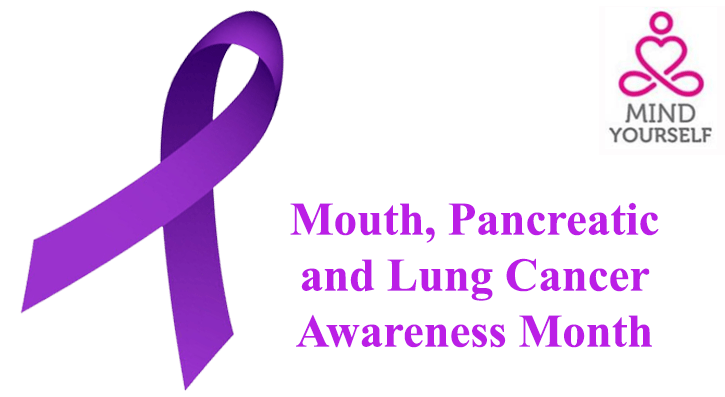Mouth, Pancreatic and Lung Cancer Awareness Month
0 min read
27 November 2018

November is Mouth, Pancreatic and Lung Cancer Awareness Month.
Be Mouthaware
- Cheek: Look out for red, white or dark patches. Put your index finger inside the cheek and your thumb on the outside. Squeeze the check to check for any lumps, tenderness or ulcers.
- Mouth: Run your finger on the roof of the mouth to feel for any lumps. Repeat on the floor of the mouth
- Neck: Feel and press along the front and sides of the neck. Can you feel any lumps?
- Head and Neck: Do both sides look the same? Look for any lumps or swelling that are only on the one side of your face.
- Lips: Pull down the lower lip and look for any sores or change in colour. Use your thumb and index finger to feel the lip for lumps or changes in texture.
- Tongue: Look for any changes in colour or texture of the surface. Check the sides for any swelling or changes in colour or ulcers. Examine the underside.
You should speak to your dentist or GP immediately if you notice any changes in your mouth.
Pancreatic Cancer
Pancreatic cancer is caused by the abnormal and uncontrolled growth of cells in the pancreas – a large gland that's part of the digestive system. It's uncommon in people under 40 years of age.
The first noticeable symptoms of pancreatic cancer are often:
- Pain in the back or stomach area – which may come and go at first and is often worse when lying down or after eating
- Unexpected weight loss
- Jaundice (yellowing of the skin and whites of the eyes) – it also may cause your urine to be dark yellow or orange, your poo (faeces) to be pale-coloured, and itchy skin
- Other possible symptoms of pancreatic cancer include: nausea and vomiting
- Changes in bowel movements (diarrhoea or constipation)
- Fever and shivering
- Indigestion
- Blood clots
Lung Cancer
Lung cancer is one of the most common and serious types of cancer. Around 44,500 people are diagnosed with the condition every year in the UK. Lung cancer mainly affects older people. It's rare in people younger than 40, and the rates of lung cancer rise sharply with age. Lung cancer is most commonly diagnosed in people aged 70-74.
Although people who have never smoked can develop lung cancer, smoking is the main cause (accounting for over 85% of cases). This is because smoking involves regularly inhaling a number of different toxic substances.
There are usually no signs or symptoms in the early stages of lung cancer, but many people with the condition eventually develop symptoms including:
- a persistent cough
- coughing up blood
- persistent
- breathlessness unexplained tiredness and weight loss
- an ache or pain when breathing or coughing
You should see your GP if you have any of these symptoms.
Page Tags
SERCLatest News
Keep up with the latest from SERC



